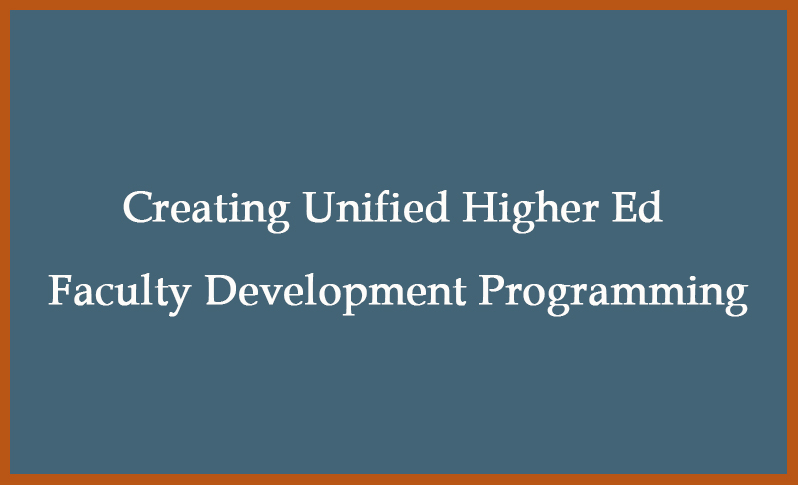In Learning To Think Things Through (2005), Gerry Nosich claims that every course needs a focus, what he calls “the central question . . . It is the unifying question, and everything in the course fits into that question” (111). In every literature course we teach, for instance, we have two central questions that we choose to formulate in the form of declarative sentences:
- Art reflects the culture that produces it.
- What differentiates art from nature is art has unity, and in literature every element—plot, character, setting, method of narration, and imagery—contributes to that unity or it doesn’t belong.
Using Values and Themes to Unify Faculty Development
Faculty development programming, likewise, needs a central concern—be it a question or declaration—around which it revolves. Why? Research demonstrates that isolated one-shot presentations have little effect on the faculty. In actuality–as we pointed out in “What Services Should a Center of Teaching and Learning (CTL) Offer?”–we divide all our CTL efforts into three types of programming—orientations, informational roundtables, and pedagogical workshops. With the exception of informational roundtables (e.g., how the counselling center works, what you need to know about disabilities and accommodations), the rest of our programming follows a unified approach. Just as iteration reinforces central concerns in courses, so that principle applies to CTLs.
How do we achieve this unity? Every CTL needs both guiding values and annual themes. Our guiding value is encapsulated in our motto “Helping Teachers Help Students Learn Deeply,” which aligns well with our unit’s (the Noel Studio) chief objective, deep student learning. This year’s major theme at the University as initiated by our provost is metacognition, so we have developed workshops and professional learning communities around that subject.
Related Reading: What Services Should a Center of Teaching and Learning Offer?
Setting Milestone Events for Faculty Programming
The chief way we create a unified program is through a series of milestone events—i.e., major programming. Milestone events are held each year and spaced out through two semesters. Faculty members rely on their existence and plan their annual professional development programs around these events. We embed the major theme in all these events. Each year we start out with four milestone events, aiming to run two per semester:
- Orientations (i.e., New Faculty, Part-Time, First-Year Courses Instructors, and Teaching Assistants): held in August before the actual start of the fall semester, these workshops introduce new instructors to the basics of becoming a successful professor.
- Provost’s Speaker Series (e.g., metacognition this year, significant learning experiences last year): chosen by the provost with consultation from our unit, this event brings in a nationally known expert to address the faculty (and occasionally students) through a lecture/workshop.
- Scholarship Week: held in April, this week-long event celebrates and showcases both faculty and student scholarship with displays, speakers, and workshops.
- Pedagogicon: held every May, this pedagogical conference started a few years ago as the Kentucky Pedagogicon, but is now increasing its participation range. This year’s theme is “Exploring High-Impact Educational Practices Using Scholarly and Creative Teaching.”
Other Events Developing Our Unified Themes
Not all faculty members are new, so attending even three events does not provide sufficient pedagogical development. Throughout the year, we also offer other ways to reinforce the academic year’s fundamental and powerful concepts, some of which we have discussed in prior blogs: classroom observations, individual consultations, workshops, and communities–i.e., professional learning communities, Breakfast and a Books, creative communities.
Related Reading: Focused Faculty Groups: Breakfast and a Book
In addition, we have this year implemented two experimental programs that we will explain in future blogs. Essentially, these new initiatives stem from the recognition that today’s faculty differ from that of even a decade ago. These newly minted profs consider teaching a 9-5 job, revere technology, and are more likely than not teaching one or more online classes. As a result, they expect training to come to them.
The Faculty Innovators initiative is an approach whereby the most effective faculty are selected, trained, and then sent back to the colleges, departments, and programs to put on workshops and provide consultations.
The Faculty Innovator Network is basically a technological resource, offering videos on important topics (e.g., student demographics at our university, how to get started publishing, an intro to metacognition).
But the key to every activity we sponsor, provide, and support is unity—somehow each one aims at transforming our students into deep learners.
Author
 Dr. Russell Carpenter is director of the Noel Studio for Academic Creativity and Program Director of the Minor in Applied Creative Thinking at Eastern Kentucky University. He is also Assistant Professor of English. Dr. Carpenter has published on the topic of creative thinking, among other areas, including two texts by New Forums Press. In addition, he has taught courses in creative thinking in EKU’s Minor in Applied Creative Thinking, which was featured in the New York Times in February 2014. Meet Russell.
Dr. Russell Carpenter is director of the Noel Studio for Academic Creativity and Program Director of the Minor in Applied Creative Thinking at Eastern Kentucky University. He is also Assistant Professor of English. Dr. Carpenter has published on the topic of creative thinking, among other areas, including two texts by New Forums Press. In addition, he has taught courses in creative thinking in EKU’s Minor in Applied Creative Thinking, which was featured in the New York Times in February 2014. Meet Russell.



